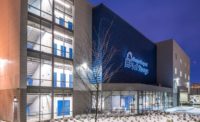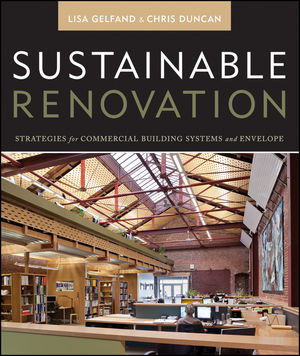The American Geophysical Union (AGU) announced formal approval from its Board of Directors to undertake a $41.7 million complete renovation of its 62,000-square-foot headquarters building, located in the Dupont Circle neighborhood. AGU is aspiring to be the first organization in the District of Columbia to renovate an existing commercial building to achieve net zero goals.
AGU is an organization dedicated to advancing science and ensuring a sustainable future. Recognizing that the aging building and infrastructure would require a major renovation after 20 years of service, AGU seized upon an opportunity to lead by example. In addition to creating a welcoming and collaborative space for its members and the D.C. community that would facilitate the understanding of Earth and space science, the organization chose to design and engineer the modernization of the building to meet net zero goals. In so doing, AGU will be able to showcase real-world scientific advancement through innovative sustainable technology. The project is expected to be a model for reducing the carbon and environmental impacts of business operations in a cost-effective and replicable way.
"AGU strives to be an innovative leader and partner that advances and communicates science's power to ensure a sustainable future – which must include re-envisioning our workplaces as livable, interconnected environments that are energy efficient, minimize our carbon footprint in the public space, and provide a healthy and dynamic ecosystem for our members and staff," said AGU's Executive Director and CEO Chris McEntee. "It must also provide an opportunity to pave the way for others looking to incorporate similar approaches and designs into new and existing facilities throughout our city."
The renovated headquarters building will also provide a collaborative, state-of-the-art conference center and work space for AGU members, the public, and staff. As a scientific destination in the nation's capital, the new building will include an interactive public exhibit that highlights the impacts and innovations of Earth and space science.
The Board approval represents a significant milestone capping off an 18-month-long approval process. Throughout, AGU's goal has been to respect the historic values of the surrounding area, and ensure public understanding of the project and its potential impacts. The project has received unanimous endorsements from Advisory Neighborhood Commission 2B (ANC 2B), and unanimous approvals from the Historic Preservation Review Board and the Board of Zoning Adjustment.
The organization, which has been part of the Dupont Circle neighborhood for nearly 40 years, also has strong support from the surrounding community, and the Dupont Circle Citizens Association.
"This innovative project for D.C. is a significant action for sustainability and an opportunity to achieve carbon neutral status," said Daniel Warwick, ANC 2B Commissioner and chair of the Zoning, Preservation, and Development Committee. "We're excited for the building to be an educational destination for the Dupont Circle neighborhood and visitors, and pave the way for similar efforts across the city and the nation."
With approval secured from the proper agencies and regulatory bodies, contractors are now preparing for the first phase of construction to begin in March 2017. The building is expected to reopen in 2018 in time for the organization's 51st annual Fall Meeting, which will bring more than 20,000 scientists to the District in December 2018. This reopening will also serve as the unofficial kick-off for AGU's centennial celebration, which will take place in 2019.
"We are excited to host AGU's annual meeting for the first time in Washington," said Destination DC President and CEO Elliott Ferguson. "It is perfect timing as they have completed a world-class renovation of their headquarters in Dupont Circle that their members can visit while meeting in the nation's capital."
Whereas other development projects are striving for net zero in their initial planning stages, this project is different in that it requires the overhaul of an existing commercial building. A building reaches net zero when it realizes an annual balance between energy demand and the creation of energy on-site. This balance will be achieved through a variety of architectural, engineering, and advanced technology methods which reduce, reclaim, absorb, or generate energy or water, including:
- 11-foot-6-inch high solar rooftop photovoltaic (PV) array to help generate on-site renewable energy
- Municipal sewer heat exchange system to recover thermal energy from wastewater beneath Florida Avenue
- Green wall to help reduce energy loads and improve indoor air quality
- Water cistern to collect rainwater from the roof, as well as condensate water from the dedicated outdoor air system, to produce all the water needed for flushing low-flow toilets and irrigating on-site
- Direct current (DC) electrified grid with DC LED lighting, which will allow the building to be more energy efficient and use power generated by the solar PV array
- Radiant cooling system that circulates chilled water through a network of pipes and uses less energy than a traditional forced-air system
- Enhanced building envelope insulation, dynamic glass shading, and triple-pane glazing, among other interior and exterior high performance strategies
Furthermore, the project goes well beyond net zero energy usage to include other sustainability elements by reusing unique architectural elements, repurposing existing building materials, and offsite recycling of demolition and construction debris.
Understanding the magnitude of the project, AGU recruited world-class experts in architecture, engineering, construction, and communication to design, plan, and manage the renovation. The project team includes:
- MGAC, Owner's Representative
- Hickok Cole Architects
- Interface Engineering
- Skanska, Development & Construction
- Stratacomm, Communications & Community Outreach
AGU looks forward to continued collaboration and support with the surrounding neighborhood, city officials, and stakeholders as the construction phase begins. For more information on the project, visit building.agu.org.










